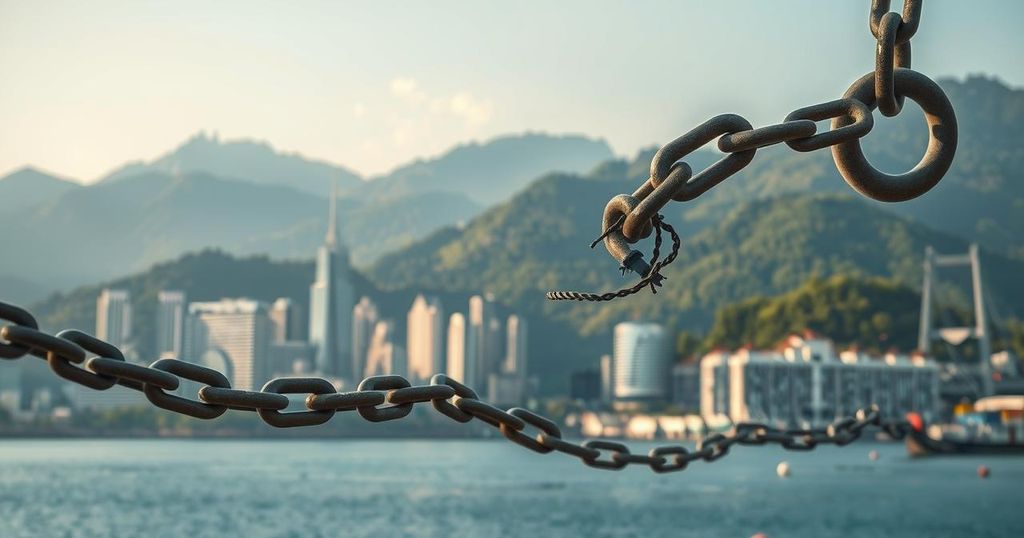The M23 rebel group has overtaken Goma, resulting in significant casualties and widespread fear among residents. Precious medical facilities are overwhelmed, treating numerous victims of violence while economic activity stalls. The absence of Congolese military presence and allegations of Rwandan support for the rebels exacerbate tensions in the region. The situation in Goma symbolizes broader instability in eastern Congo, pressing for urgent humanitarian intervention.
Upon entering the eastern city of Goma in the Democratic Republic of Congo, the atmosphere initially appeared typical with bustling streets and busy residents. However, it quickly became evident that the M23 rebel group had taken control, following a swift assault that captured the city. With nearly 700 fatalities reported, the M23 fighters, who advocate for the rights of Tutsi minorities, now maintain a stronghold amid the ongoing strife with government forces backed by Rwanda.
At a checkpoint manned by M23 insurgents, we were scrutinized before being allowed access to the chaotic city. A visit to a hospital revealed devastating injuries; many civilians had faced brutal violence, exemplified by Dr. Nathaniel Cirho who, after being wounded by shrapnel, mourned the death of a neighbor who had been injured alongside him. The hospital was inundated with patients, indicating the scale of the violence in the conflict.
Reports of horrifying circumstances occurred throughout the region, including survivors recounting their traumatic experiences. An elderly woman who treated her gunshot wound nearly independently highlighted the dire conditions. Local medical facilities, already stretched thin, reported significant increases in patients suffering from gunshot wounds and other injuries linked to the recent clashes.
Amidst the apparent calm following intense fighting, economic activity remains subdued, with many businesses closed or barely operational. Residents, like shop owner Sammy Matabishi, expressed no sign of confidence, as many had fled to neighboring countries due to the insecurity. The pervasive presence of M23 confirms a chilling atmosphere, where their authority has taken precedence over local governance.
During my visit, the absence of any visible Congolese military forces was striking, with local residents sharing stories of soldiers abandoning their posts. The M23’s advance has caused alarm internationally, as they now target further territorial gains, aiming toward Bukavu and potentially beyond. The Congolese government remains adamant in its efforts to reclaim lost territories while blaming Rwanda for complicity in supporting the insurgents.
The ongoing conflict in Goma reflects the precarious balance of power in eastern DRC. The situation raises concerns for the future of the region and its inhabitants, as M23’s continued control may herald further instability and violence in the already fractured landscape of the DRC. The need for immediate humanitarian assistance and political resolution has become critical in these challenging times.
The Democratic Republic of Congo’s eastern territories, particularly Goma, have been embroiled in conflict for decades, primarily due to various rebel groups seeking autonomy and control over valuable mineral resources. The M23 group, representing Tutsi interests, has continually engaged in armed confrontations with Congolese forces, often linked with neighboring Rwanda. Significant humanitarian crises have arisen as armed confrontations escalate, resulting in extensive displacement and increased violence against civilians, particularly women, amid reports of sexual violence as a wartime tactic.
Goma’s recent occupation by the M23 rebels signifies a crucial shift in the balance of power within eastern DRC, with dire implications for local civilians. The ongoing violence and humanitarian crises underscore the urgent need for concerted international efforts to stabilize the area and support affected populations. The interplay of local armed factions and regional politics complicates the path to peace, necessitating in-depth dialogue and intervention to address the root causes of conflict and foster sustainable solutions.
Original Source: www.bbc.co.uk




